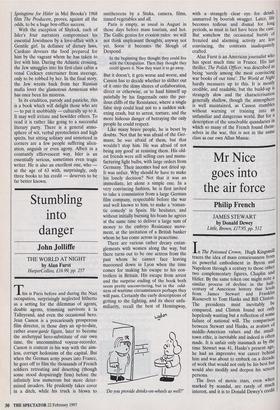A touch of genius
Francis King
OP. NON CIT. by Alan Isler Cape, £12.99, pp. 215 Despite the world of fiction being so incestuously cramped, coincidences are more common than plagiarism in it. The last novel I reviewed in these pages, Caryl Phillips's The Nature of Blood, deals with the ugliness of racism and consists of four interlinked stories, one of which is narrated by Othello. Man Isler's Op. Non Cit. simi- larly deals with the ugliness of racism and consists of four stories, one of which is nar- rated by Shylock. The difference is that whereas the racism of Phillips's stories all too often leads to humiliation, madness and death, that of Isler's leads merely to Physical and spiritual discomfort or malaise. To read Phillips's volume is to submit to an essentially searing experience; to read Isler's is to enjoy oneself. It is soon clear that there is a reason for Isler's curious and even off-putting title Op. No Cit. The narrators of these four tales make a series of acquaintances without their ever being wholly aware that each such fleeting brush, as with a passer-by in a busy street, has been with a man of excep- tional talent or even genius. In the first story, 'The Monster', Shylock encounters the legendary traveller Thomas Coryate described by Ben Jonson as 'a great and bold carpenter of words' — who is wander- ing through Venice in search of 'bona- robas, (whores). In the second story, the Jewish violin-maker Cardozo is on his way
from Porlock to Bristol, with a dulcimer for a damsel, when he encounters a stranger
Who, by his own declaration, is 'something of a philosopher, something of a journalist, even something of a poet'. Though Cardo- zo never discovers it, the stranger is Coleridge. In the third story, set aboard a luxury liner crossing the Atlantic in 1881, two people equally unwelcome in that social milieu, a rich Jew and Oscar Wilde, are drawn to each other. The Jew tells Wilde of someone of his acquaintance who, as a baby, was found abandoned in a handbag In the cloakroom of Victoria station. The final story, The Affair', is a contemporary one, in which the Jewish hero, an expert on Dreyfus, is involved in a musical about the Dreyfus Affair, which, like the musical Springtime for Hitler in Mel Brooks's 1968 film The Producers, proves, against all the odds, to be a huge box-office success.
With the exception of Shylock, each of Isler's four narrators compromises his essential Jewishness by a love-affair with a Gentile girl. In defiance of dietary laws, Cardozo devours the food prepared for him by the vagrant whom he has taken to live with him. During the Atlantic crossing, the Jew smuggles into his first-class cabin a venal Cockney entertainer from steerage, only to be robbed by her. In the final story, the Jew wrests back from her Russian mafia lover the glamorous Armenian who has once been his mistress.
In its erudition, parody and pastiche, this is a book which will delight those who are — to put it snobbishly — culturally up to it. It may well irritate and bewilder others. To read it is rather like going to a successful literary party. There is a general atmo- sphere of wit, verbal pyrotechnics and high spirits, but sitting solitary and unnoticed in corners are a few people suffering alien- ation, anguish or even agony. Albeit in a constantly effervescent way, Isler is an essentially serious, sometimes even tragic writer. He is also an excellent one, who at the age of 63 with, surprisingly, only three books to his credit — deserves to be far better known.



























































 Previous page
Previous page